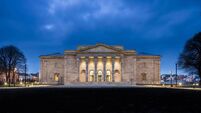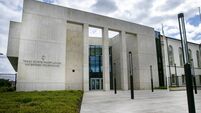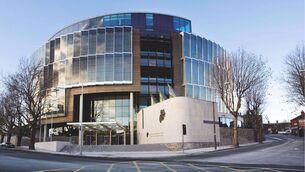The Big Déise Interview: Bishop Cullinan reflects on 10 years as Bishop of Waterford & Lismore
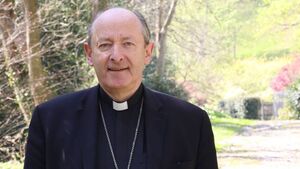
Bishop of the Diocese of Waterford & Lismore, Alphonsus Cullinan.
It has been 10 years since Bishop Alphonsus ‘Phonsie’ Cullinan was ordained Bishop of Waterford and Lismore.
A happy childhood spent in County Clare alongside his four sisters and five brothers, was followed by a career as a primary school teacher, before eventually deciding to join the priesthood.
The Waterford News & Star met with the Bishop in the library of Bishop’s House last week, to speak about his life in the diocese and what the future holds.
“It has been a very fast 10 years, and if the Lord spares me I have another 10 to go," he said.
Bishop Alphonsus Cullinan was born in Lahinch, County Clare, in 1959 to Christy and Rita.
From 1978-1981 he attended Mary Immaculate College of Education, Limerick, and qualified as a primary teacher.
He taught for six years in Castleconnell, County Limerick.
During this time, he also worked part-time with the Bunratty Castle Entertainers, before going to Spain where he taught English for two years in a school in Valladolid.
He says it was during his time in Spain that he experienced a hugely significant awakening.
“When I was in Ireland I had very good friends. We played soccer, we did amateur theatricals, we went out together and all the rest of it. It was all great fun but I was always doing what the group was doing.
“Then when I went to Spain I was suddenly on my own. I had lots of good friends there, but I had to start thinking for myself.
"So it was there that I really stood on my own two feet more and discovered that, in fact, I had a vocation with the priesthood.“
He was subsequently ordained by Bishop Jeremiah Newman in 1994 in Saint John’s Cathedral, Limerick, and appointed Curate in Saint Munchin’s Parish, Limerick City, from 1995-1996.
He studied for his doctorate in moral theology in the Alfonsianum in Rome from 2001-2004 and was appointed chaplain to Limerick Institute of Technology from 2004-2011.
He was appointed Parish Priest of Rathkeale, County Limerick, in 2011, and was ordained Bishop of Waterford & Lismore on Sunday, April 12, 2015.
One of his first major roles as Bishop in the diocese was the development of Glencomeragh House in 2016.
Maura Murphy, Fr. Patrick Cahill and Pat Reynolds, who, having worked with young people for years, had seen massive potential in developing a centre locally in Waterford for the training of young Catholics to do youth ministry work in parishes and schools across the country.
And so the trio approached the freshly ordained new Bishop with the idea.
Interestingly, the following day, the Rosminian priest responsible for Glencomeragh House called to say that they would be pulling out of the residence and he offered the property to the diocese, an opportunity that was leapt at.
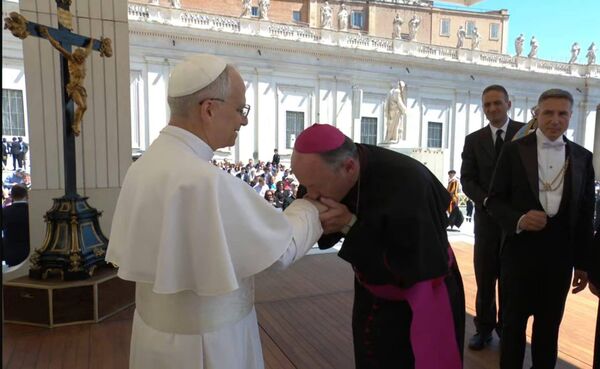
Another notable achievement within the diocese over the past decade, as highlighted by the Bishop, is the opening of the Little Nelly’s Baby Bank at St John's Pastoral Centre.
The initiative was established to provide material support for expectant mothers and families in need, including clothing, buggies, nappies and baby equipment.
The name was inspired by Waterford’s Ellen Organ, who, the Bishop described, as "a little saint".
He added: "The hall is jam-packed with stuff. You wouldn't believe how much we have there, and it's amazing to see the number of people who come in and the amount of volunteers there."
During our interview, the Bishop highlighted the massively important role sacristans and the 87 local priests play in the daily upkeep of the diocese.
He noted that among the most meaningful aspects of his past decade of service has been the privilege of engaging with and collaborating alongside countless parishioners and clergy members.
“I'm very fortunate with the team of people I have here in the pastoral centre and in the office here, we get along very well and I think there's a common sense of mission,” he said.
“The priests, they really are heroes, they're great guys.”
“I go around and meet the sacristans and the religious sisters and brothers, and they're getting older now, but they've done such amazing work over the years, and that's something I need to do a lot more of, is going around to parishes.
“I love getting out meeting people, actually in small groups rather than big groups together.”
One way in which the Bishop has been doing this is via a tent, which he opens to the public outside the Cathedral of the Most Holy Trinity in Waterford City.
He says that people of all ages and walks of life approach the tent to receive a blessing or for a prayer.
“I love sitting outside the cathedral in my little tent on Saturdays,” he said.
“Last week I started there at about 1:15pm and I finished at about 5.30pm, and it was fantastic.
“I was noticing as well the number of people going in to say a prayer in the Cathedral and a lot of young people. I've really noticed that trend lately.
"They may not be going to mass, but they're certainly praying and they're searching and they're looking for something real and true and authentic, and I'm very hopeful about that.”
The need to modernise the Church continues to reveal itself as a central point of dialogue among clergy and parishioners alike.
Bishop Cullinan says the sharp rise of technology over the past 10 years has been one way in which the church can be modernised.
He is currently in the process of starting his own podcast series, and has for a long time been using Facebook as a means to connect with parishioners via his live prayer sessions.
"I meet people quite often who say 'I follow you on Facebook', and if it's a help to them in their prayer, that's fantastic," he said.
“I would say there are a lot of guys in Maynooth who use the phone to deepen their faith, because there's a lot of good stuff on there.
“A lot of people are doing podcasts from their kitchen, women and men, people of all ages, all backgrounds, and so using technology is good.“
Amidst these positive digital developments, there is, of course, increasing concern surrounding a decrease in mass attendance, shortages of priests and growing threats of church closures, not only in Waterford & Lismore, but across the country.
Bishop Cullinan, whilst acknowledging the challenge of solving such issues, says that there is hope for the future.
"Obviously most people don't go to mass, but by the same token, they do see the value of it, especially when somebody dies, or for community building.
“Mass used to be and still is for some, a highlight of the week, to meet God and then to meet the neighbours. There's great grace in that.
“We are in a time of so much connectivity with the phones and so much technology, and yet we can be so isolated and individualistic.
"The phone has such a draw and I have the same struggle, but God connects us together and that's what mass does, is brings us together."
He added that something he hopes to see more of in the future is families attending mass together.
"It all comes down to family, family is so important.
"I've seen it over and over again, the benefits of families coming to mass and when they make that effort to go to mass even if maybe the youngsters don't want to go.
"I would say to them keep doing it, because that is such a blessing."
Shortly before his death, Pope Francis announced that the theme for the Jubilee year of 2025 was ‘Pilgrims of Hope’.
Finishing our interview with a message of hope, Bishop Cullinan said: “St. Augustine says somewhere in his writings: ‘Live a good life and the times will be good’. Sometimes, because of all the news we get we worry about the world, and people's blood pressure is going up and they're getting more stressed.
"But all you have to worry about is 24 hours. Yesterday's gone. Tomorrow, we'll leave that until it comes. Let's live a good virtuous life today and the times will be good."
